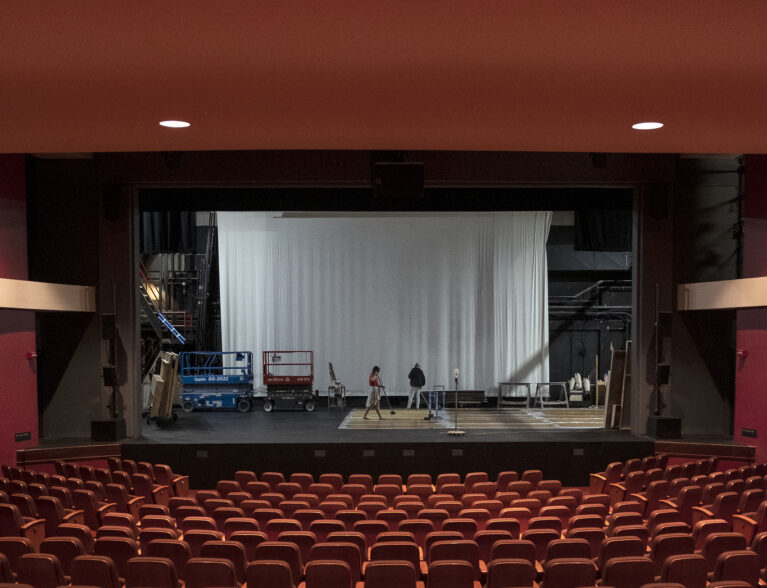
The 2023-24 season at Riverside Theatre was a roaring success for audiences, but behind the scenes, at least two people fell and sustained injuries, the theater was cited for OSHA violations and the stage technicians unionized, citing safety concerns and unfair compensation.
In April, six of the eight full-time stage technicians at Riverside voted to organize under the International Alliance of Theatrical Stage Employees Local 500 union.
Long hours due to understaffing, they said, had led to an unsafe work environment and accidents – one of which sent a musician to the emergency room with a broken jaw and led to a $12,445 penalty from the U.S. Department of Labor’s Occupational Safety and Health Administration (OSHA).
Stage crew members told Vero Beach 32963 they had brought their concerns to Managing Director Jon Moses starting last fall.
Crew members said the problems began during preparations for “Million Dollar Quartet,” the first mainstage show of the season, which ran from Oct. 24 to Nov. 12.
“It became clear that the design team for the production weren’t doing their jobs,” said former Lighting Supervisor Will Gibbons Brown. Brown told Moses about the problems with the lighting design team during production meetings of key crew members. “Those concerns were ignored,” Brown said.
Moses denied he was informed ahead of time about problems with the “Million Dollar Quartet” lighting design. Weeks later when the lighting designer arrived at the theater for technical rehearsals, he was fired. Moses confirmed this.
But the lighting still had to be made right so the show could open on time. Brown and Assistant Lighting Supervisor Fiona Govin worked dozens of overtime hours redesigning the lighting just days before the show previewed for friends and family, they said.
“There were so many instances where we said, ‘This isn’t going to go well,’ and it didn’t go well,” Govin said. “But it only ended up hurting Will and me.”
In response to the allegation that complaints throughout the season about workplace safety fell on deaf ears, Moses said no safety concerns were brought to his attention prior to January, when he received a complaint during rehearsals for the show “Jersey Boys,” which ran from Jan. 2-28.
For that show, musicians performed on a platform 8 feet above the stage. The musicians felt the platform did not have adequate safety railing. OSHA requires railings or other safety equipment for platforms higher than four feet. Moses said the complaint was addressed immediately and a railing was added by Technical Director Jordan Lippert.
However, during a rehearsal, a musician fell from the platform to the stage floor below, striking his head on scenery and breaking his jaw. An additional railing was installed, the musician was replaced, and “Jersey Boys” opened to audiences the next day, Jan. 2. OSHA arrived for its inspection on Jan. 3, according to the inspection report obtained by Vero Beach 32963.
Moses insisted that the fall occurred from a different location from where the additional safety railing had been installed. “The accident happened because of an oversight by stage management, by the production crew, by everyone, as it was not considered that that would happen,” Moses said.
After the musician fell 8 feet to the stage, “the cast members and crew that were present felt traumatized,” said Brittany Dagget Duffy, who worked as an assistant scenic charge artist this season. She brought up the accident at the next production meeting led by Moses. “I felt like I was being shut down. They were more concerned about appeasing the designers than they were about whether or not the crew was safe or were getting enough sleep at night,” she said.
The loading docks were another worrisome area for the crew. During a “load-in” of equipment, a female carpenter fell off one of the loading docks, Duffy said. Fortunately, the carpenter was not seriously injured. Duffy said she asked Moses and others in management multiple times for safety railings on the docks.
Communication between the production team and managers continued to deteriorate, Brown said. “(Moses) felt his way was the best way, but he refused to listen to the people doing the work,” Brown said.
During the run-up to “Kinky Boots,” which ran from Feb. 20 to March 17, Brown said there were serious issues that put theater employees at risk. He and Govin each worked more than 130 hours over 10 days without a day off and without overtime pay. Brown sent a message to Moses on Feb. 22 complaining about the long hours. Moses fired him the same day.
“People were massively fatigued. The fatigue leads to mistakes, it leads to accidents, and it pushes people to their emotional and mental limits. Which is why we ended up turning to the union,” Brown said.
Duffy was fired on Feb. 23, a day after Brown was fired. Both believe they were fired because they were vocal about safety issues and strong advocates for unionizing. Moses flatly denied this, but declined to say why they were fired.
“Any problem that came to us by staff was addressed immediately,” Moses insisted.
All theater employees are expected to deal with long hours and the schedules are set by the actors’ union, he said. Actors and musicians performing at Riverside were already represented by unions.
During tech week, which is the week before a show opens, actors work two five-hour rehearsals per day, with a two-hour break in between, Moses said.
“Some employees handle it fine, other employees don’t,” Moses said. “This particular season was a difficult season, for sure, but our reputation and our longstanding track record of being safe and being productive and attentive to staff needs far outweighs this one season.”



